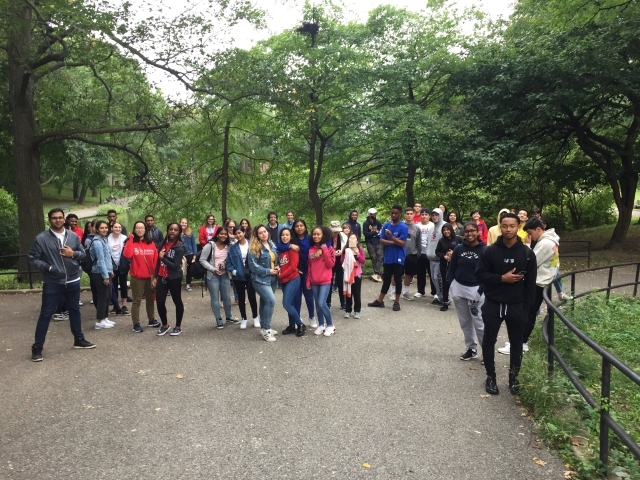
The Environmental Studies program, led by Professor of Biological Sciences and Program Director Dianella Howarth, Ph.D., offered two exciting and engaging events for students in the fall 2018 semester: a “Bio Blitz” activity in Captain Tilly Park, and a well-attended lecture by artist Mary Mattingly.
On Saturday, October 8, 2018 four faculty members and more than 50 students participated in a “Bio Blitz” in Captain Tilly Park, located within walking distance from the St. John’s University Queens campus in Queens, NY. Using the iNaturalist app, students photographed, identified, and entered location data for over 1200 organisms, covering 263 different species. The organisms included plants, mammals, reptiles, and insects.
The project arose from an interdisciplinary learning community developed by faculty members: Dr. Howarth; Associate Professor in the Institute for Core StudiesPaula Lazrus, Ph.D.; Assistant Professor of Biological Sciences Juan Santos, Ph.D.; and Adjunct Assistant Professor of Theology and Religious StudiesCarole Pacula, Ph.D. Courses within the learning community include two sections of Fundamentals of Biology, Scientific Inquiry, and two sections of Perspectives on Christianity.
The data generated by students for this citizen science project is entered into the NYC EcoFlora Project and will be accessed by researchers around the globe. A map of the students’ observations is available online. Students worked in groups of 2-3 across the learning community and competed against each other to document the most observations, and the most photographed organism was the mallard duck.
“There were very few data points of what organisms were living in Captain Tilly Park before our event,” said Dr. Howarth. “The students really seemed to have a great time populating the map with data. For many of our students who are urban natives, it was exciting to discover how much is in our own backyard.”
On Monday, October 22 during Common Hour, the Environmental Studies Program Annual Lecture Series featured Mary Mattingly, who presented her Swale project to those in attendance. Swale, which Mattingly founded in 2016, is a floating food forest built atop a barge that travels to piers in New York City, offering educational programming and welcoming visitors to harvest fresh food for free. Swale strives to strengthen stewardship of public waterways and land, while working to shift policies that will increase the presence of edible perennial landscapes.
Sophomore History major Hunter Dobson was among the approximately 150 attendees at Ms. Mattingly’s talk: “I feel that Mary Mattingly's lecture on her work with Swale shows the importance of projects that can engage an entire community. Swale is an example of how art can be combined with environmental issues in a way to get people more interested and involved in nature and science.”
First-year History major Sulai Malpica also attended the event: “It was interesting to see how Ms. Mattingly connected art and science, two subjects that are generally polar opposites. Her Swale project got me and other non-scientists to be interested in our environment, our negative effect on it, and what we can do to help.”
